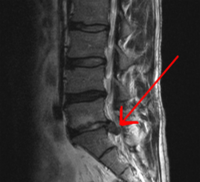
Photo from wikipedia
Purpose Lumbar disc herniation (LDH) is an important cause of back pain and sciatica, but its aetiology is not fully understood. Single-nucleotide polymorphisms (SNPs) in specific collagen genes are known… Click to show full abstract
Purpose Lumbar disc herniation (LDH) is an important cause of back pain and sciatica, but its aetiology is not fully understood. Single-nucleotide polymorphisms (SNPs) in specific collagen genes are known to increase the risk of lumbar disc degeneration. We performed a case–control study among the Chinese Han population to investigate whether genetic variations in collagen genes were associated with the risk of LDH or not. Methods We genotyped SNPs selected from 1000 Genome Projects using Agena MassARRAY technology. Three hundred and eighty-four LDH cases were compared with 384 controls of similar age, using the odds ratio and 95% confidence interval to calculate the susceptibility in several genetic models. Results Our results revealed that subjects with the rs6122316-C variant of the COL9A3 gene had a higher likelihood of LDH than subjects with the allele T variant in both the codominant and recessive models. In addition, after gender stratification analysis, we found significant associations between rs16970089 and rs740024 and LDH risk in females. Age stratification analysis illustrated that rs16970089 and rs6122316 were also correlated with LDH risk in people over 50 years. The smoking stratification illustrated that rs2071358 and rs740024 had an increased association with LDH risk in smokers. And after drinking stratification, we also observed the significance between rs740024 and LDH risk. Conclusions Variants in genes for COL1A1 , COL9A3 and COL2A1 significantly influence the risk of LDH. Large and well-designed studies are needed to confirm and explain these conclusions. Graphic abstract These slides can be retrieved under Electronic Supplementary Material.
Journal Title: European Spine Journal
Year Published: 2020
Link to full text (if available)
Share on Social Media: Sign Up to like & get
recommendations!